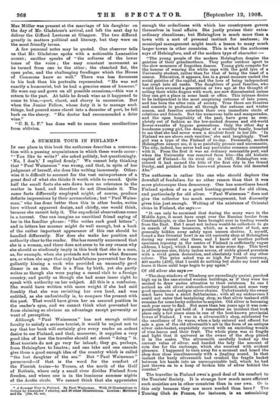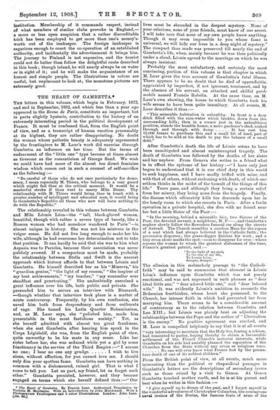A SUMMER TOUR IN FINLAND.* IN one place in this
book the authoress describes a conversa- tion with a passing acquaintance in which these words occur : "'You like to write ? ' she asked politely, but questioningly.
No, I don't,' I replied firmly." We cannot help thinking that "Paul Waineman" was wrong, and that, in spite of her judgment of herself, she does like writing immensely. Other- wise it is difficult to account for the vast unimportance of a great deal of what she thinks it worth while to record. Quite half the small facts she seta down have no relevance to the matter in hand, and therefore do not illuminate it. The same facts differently employed might., of course, produce definite impressions by their accumulation; but "Paul Waine- man," who has done better than this in other books, writes here without apparent design, and chiefly, one would think, because she cannot help it. The superficial observations come in a torrent. One can imagine an uncritical friend saying of her in the familiar phrase : "She writes such good letters"; and in letters her manner might do well enough, but a book of the rather important appearance of this one should be handled differently. Nor does she make her position and authority clear to the reader. She has recently announced that she is a woman, and there does not seem to be any reason why she should so studiously imply in this book that she is a man, as, for example, when she pretends not to know what flounces are, or when she says that only bashfulness prevented her from gallantly kissing a cook who provided an unusually good dinner in an inn. She is a Finn by birth, yet she partly writes as though she were paying a casual visit to a foreign country, and partly as though she bad some inner right to speak with authority on her subject. All this is a confusion. She would have written with more weight if she had said frankly that she was revisiting her own land, and was entitled, as she undoubtedly is, to compare the present with the past. That would have given her an assured position in the reader's eyes, and we cannot think what prevented her from claiming so obvious an advantage except perversity or want of perception.
Although "Paul Waineman" has not enough critical faculty to satisfy a serious tourist, it would be unjust not to say that her book will certainly give every reader an ardent desire to see Finland, and that, moreover, it supplies a very good idea of how the traveller should set about " doing " it. Most tourists do not go very far inland; they go, perhaps, from Helsingfors to Imatra ; and one lake and one cascade give them a good enough idea of the country which is called "the lost daughter of the sea." But "Paul Waineman" persevered—if that is the word for the comfort of the Finnish trains—to Tornea, at the north of the Gulf of Bothnia, where only a small river divides Finland from Sweden, and where one is in the luminous summer nights of the Arctic circle. We cannot think that she appreciates A Summer Tour in Finland. By Paul Waineman. With 16 Illustrations in Colour by Alexander I ederley, and 16 other Illustrations. London: Methuen and Co. [10e. 6d. net,
enough the orderliness with which her countrymen govern themselves in local affairs. She justly praises their extra- ordinary cleanliness; but Helsingfors is much more than a town with a sort of personal instinct for neatness ; its municipal management might teach a lesson to many much larger towns in other countries. This is what the authoress says of Helsingfors, and of the modern type of character :—
"The young people of the modern Helsingfors despise the gaieties of their grandmothers. They prefer outdoor sport to the slow measures of forgotten dances. Young girls compete for the honour of wearing the white caps with the gold lyre of a University student, rather than for that of being the toast of a season. Education, it appears, has in a great measure ousted the social gaieties of the capital, and the love of being independent has crept into all ranks. The daughters of good families, who would have swooned a generation or two ago at the thought of soiling their white fingers with work, are now discontented unless they can get a place in some bank or office. This intense desire to be independent is the most surprising outcome of late years, and has been the utter ruin of society. True there are theatres and concerts in profusion all through the autumn and winter season, and families entertain their own immediate circle of relations and friends. But the numerous balls and masquerades, and the open hospitality of the past, have gone as com- pletely out of fashion as the low-necked dresses and old-world flower-wreaths of bygone generations. Only the other day a handsome young girl, the daughter of a wealthy family, boasted to me that she had never worn a dicollete frock in her life. In Finland we are above such vanities,' she said laughingly. That girl was a type of the Finland of to-day. Personally, modern Helsingfors annoys me, it is so painfully prosaic and unromantic. The city, indeed, has never had any particular romance connected with it. From the first it was an ordinary mercantile port, and when the University was removed from Abe—the old historic capital of Finland—to its rival city in 1827, Helsingfors con- sidered it had earned the title of the first city in the Grand Duchy, and prinked in the borrowed plumes from old deserted Abo."
The authoress is rather like one who should deplore the downfall of feudalism for no other reason than that it was more picturesque than democracy. One has sometimes heard Finland spoken of as a good hunting-ground for old china, and particularly for old silver. "Paul Waineman" does not give the collector too much encouragement, but discreetly gives him just enough. Writing of the existence of Oriental china in Finland, she says :— " It can only be surmised that during the many wars in the Middle Ages, it must have crept over the Russian border from Constantinople, or else have been brought over in trading vessels from the East. But I must not induce would-be collectors to go in search of these treasures, which, as a matter of fact, are generally hidden away safely upon unseen shelves. I, myself, found a fine Oriental bowl in an old curiosity shop at Helsingfors during my recent stay there, and I know of another perfect specimen reposing in the centre of Finland (a sufficiently vague address, I hope), which I mean to be mine some day. This bowl is of immense size, thirty inches across, of richly glazed porcelain with a vivid green decoration, and absolutely void of any other colour. The price asked was so high for Finnish currency, 400 marks (.216), that I could do nothing but shake my head and leave it there until hops begin to pay again."
Of old silver she says :--
" The shop windows of Uleaborg are exceedingly quaint, perched high up in the one-storied wooden buildings, as if they were too modest to draw undue attention to their existence. In one I noticed an old silver sixteenth-century tankard, and 801110 very good specimens of antique silver chains. Unfortunately the owner must have been a strict Sabbatarian ; with all my endeavours I could not enter that tantalising shop, so that silver tankard still remains for some lucky collector to acquire. Old silver is becoming each year rarer to find. Not more than ten years ago it was com- paratively easily got hold of. I remember an incident that took place only a few years since in one of the best-known provincial towns of Finland. I was in a silversmith's shop, celebrated for the excellence of its wares, when a lady entered and offered for sale a gem of the old silversmith's art in the form of an antique silver cake-basket, exquisitely carved with an encircling wreath of vine leaves and their fruit. The whole piece was so fragile and light that it quivered as the owner of the shop placed it in the scales. The silversmith carefully looked up the current value of silver, and handed the lady the amount of coin due for the exchange, which she received with evident pleasure. I happened to turn away for a moment and heard the shop door close simultaneously with a jingling sound. In that instant the burly silversmith had crushed the fragile basket between his hands into an unrecognizable ball, which he had just thrown on to a heap of broken bits of silver behind the counter."
The traveller in Finland owes-a good deal of his comfort to the Tourists' Society. It is strange how much more efficient such societies are in other countries than in our own. Or is this only because they are more needed than here ? The Touring (flub de France, for instance, is an astonishing
institution. Membership of it commands respect, instead of what members of similar clubs provoke in England,— a more or less open suspicion that a rather discreditable trick has been employed to get more than one's money's- worth out of the innkeeper. The foreign innkeeper is sagacious enough to court the co-operation of an established authority, and incidentally the advertisement it brings him. The journey to Finland is not expensive, and the tourist could not do better than follow the delightful route described in this book ; though inland, he will nearly always be on water or in sight of it; and he will make the acquaintance of an honest and simple people. The illustrations in colour are useful, but unpleasant to look at.; the monotone pictures are extremely good.











































 Previous page
Previous page